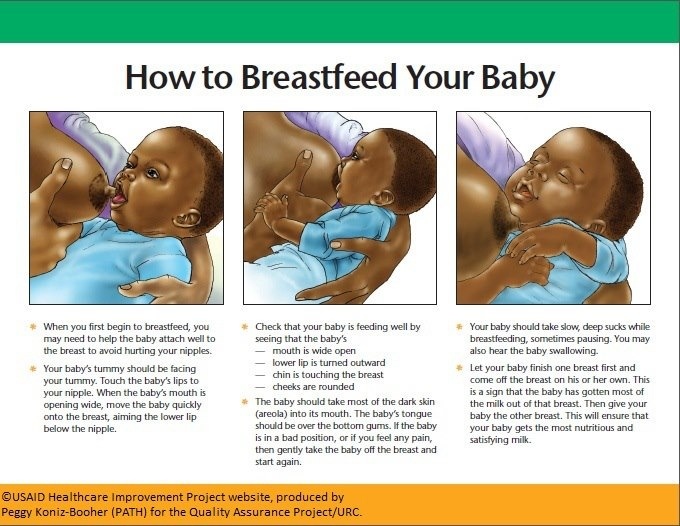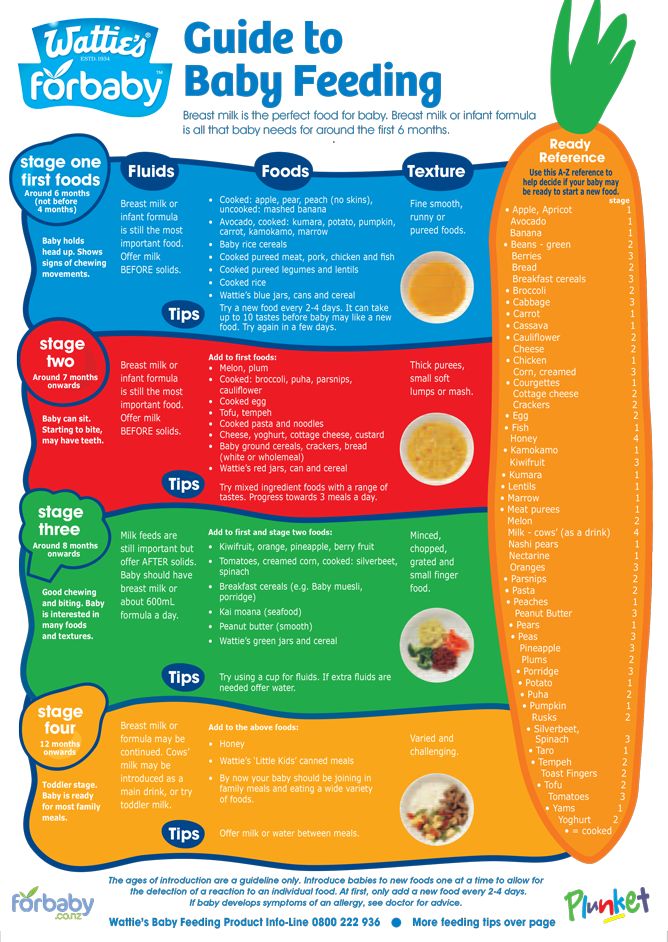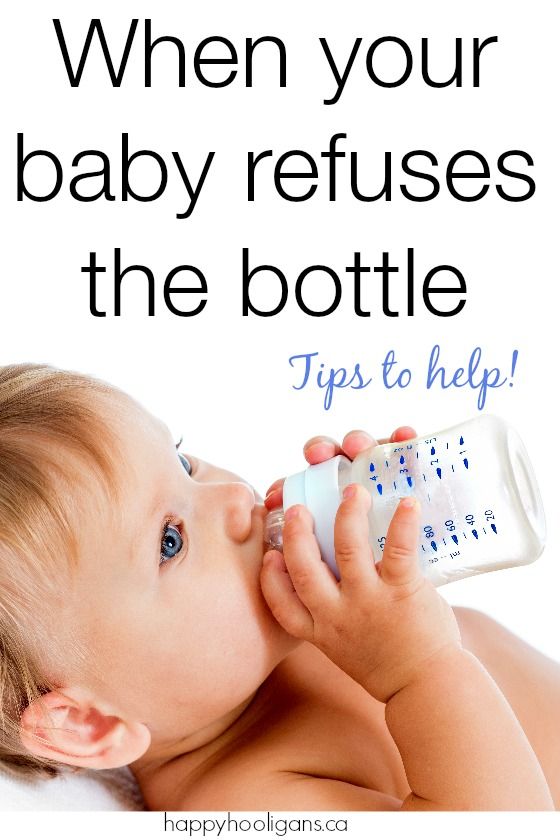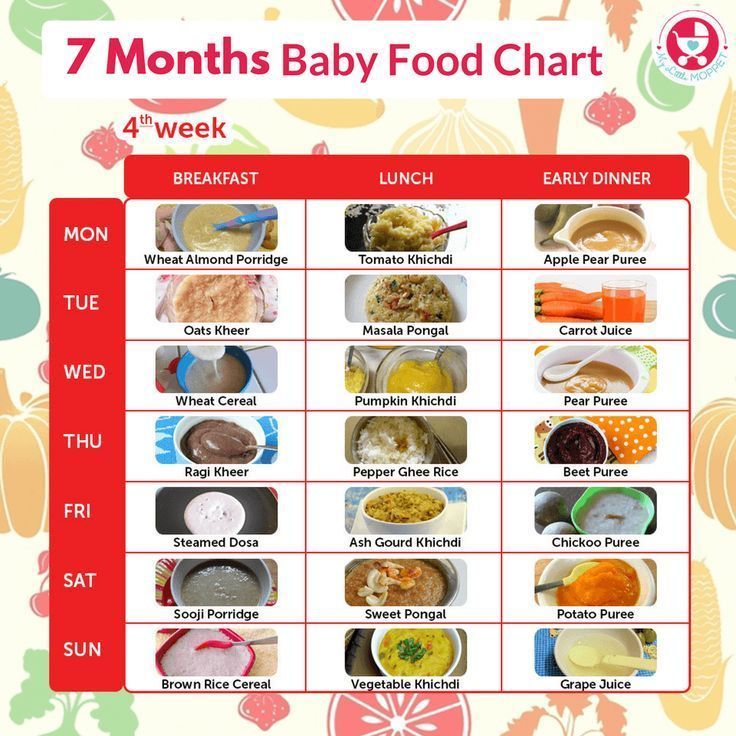Baby choking on milk while feeding
Help! My Baby Is Choking on Milk!
Many parents look forward to feeding time with their baby. It’s a chance to bond and also gives you a few minutes of peace and quiet.
But for some, bottle feeding or breastfeeding can lead to gagging or choking sounds, which are alarming if you’re a new parent. Fortunately, there are things you can do to help prevent your baby from choking on milk or formula.
If your baby seems to gag a lot while eating, don’t panic. “Choking and gagging during feeding is common in young infants,” says Robert Hamilton, MD, FAAP, a pediatrician at Providence Saint John’s Health Center in Santa Monica.
Hamilton says babies are born with an exaggerated but protective “hyper-gag reflex,” which can cause gagging while feeding. Plus, babies gag easily due to their own neurologic immaturity.
“Babies are growing and learning new ways to use their body (and mouths) every day,” says Amanda Gorman, CPNP and founder of Nest Collaborative, a collection of International Board Certified Lactation Consultants.
“Often, just stopping the feed and positioning the baby upright with good head and neck support will give them a few seconds to manage the problem.”
Gina Posner, MD, a pediatrician at MemorialCare Orange Coast Medical Center, says if your baby begins to choke, let them stop feeding for a little bit and pat their back. “Typically, if they’re choking on liquids, it will resolve quickly,” she says.
The most common reason a baby chokes during breastfeeding is that milk is coming out faster than your baby can swallow. Usually, this happens when mom has an oversupply of milk.
According to the La Leche League International (LLLI), common signs of oversupply include restlessness at the breast, coughing, choking, or gulping milk, especially at let down, and biting on the nipple to stop the flow of milk, among others.
You might also have an overactive let down, which causes a forceful flow of milk into your baby’s mouth. When your breasts are stimulated by your baby suckling, oxytocin causes the let-down reflex that releases the milk.
If you have an overactive or forceful let down, this release happens too fast for your baby to respond appropriately, causing them to gulp or choke while breastfeeding.
How do I prevent my baby from choking on milk when breastfeeding?
One of the first things you can do to help prevent your baby from choking while eating is to change the feeding position.
“For breastfeeding mothers who appear to have overactive let down, we typically recommend they nurse in a laid-back position, which reverses gravity’s effect and allows baby to have more control,” says Gorman.
Posner recommends pulling your baby off the breast every once in a while to help them catch their breath and slow down. You can also take your baby off the breast for 20 to 30 seconds when your milk first lets down.
In addition to a laid-back position, the LLL recommends lying on your side so your baby can allow milk to dribble out of his mouth when it flows too quickly.
Furthermore, expressing milk for 1 to 2 minutes before bringing your baby to your breast can help.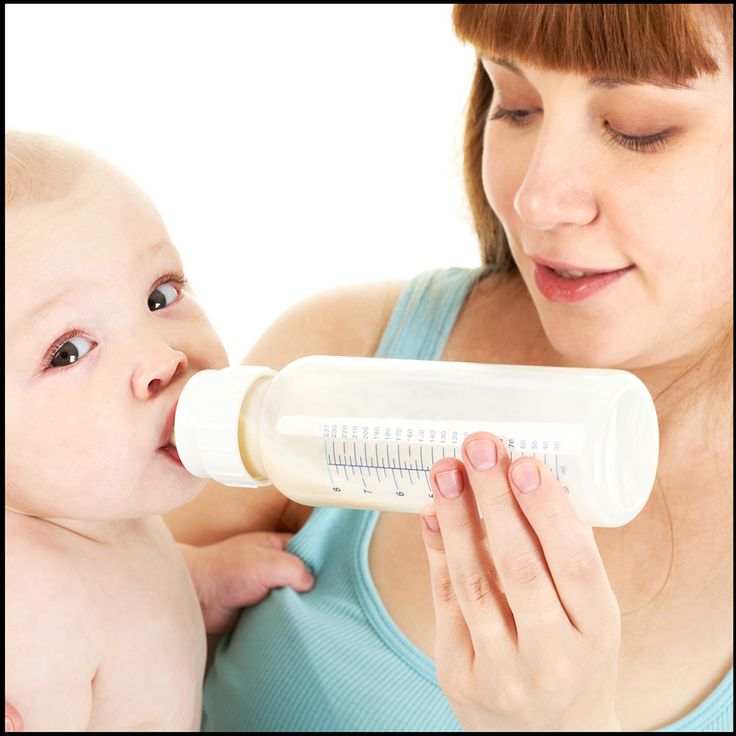 Doing so allows the forceful let down to happen before baby latches. That said, be careful with this technique, as pumping for too long will tell your body to make more milk and worsen the problem.
Doing so allows the forceful let down to happen before baby latches. That said, be careful with this technique, as pumping for too long will tell your body to make more milk and worsen the problem.
When your baby gags when drinking from a bottle, it’s often due to the positioning. Lying your baby on their back while bottle feeding will lead to a faster milk flow, making it harder for your baby to control the rate of feeding.
“Tilting the bottom of the bottle higher than the nipple increases the rate of milk flow, as will a nipple with too large of a hole for the infant’s age,” Gorman advises. Tilting the bottle too high can lead to involuntary increases in intake and contribute to problems like reflux.
Instead, when bottle-feeding an infant, try using a technique called paced bottle-feeding. “By keeping the bottle parallel to the ground, the baby remains in control of the milk flow, as they are at the breast,” Gorman says.
This technique allows your baby to actively pull milk out of the bottle using their sucking skills and lets them easily take a break when needed.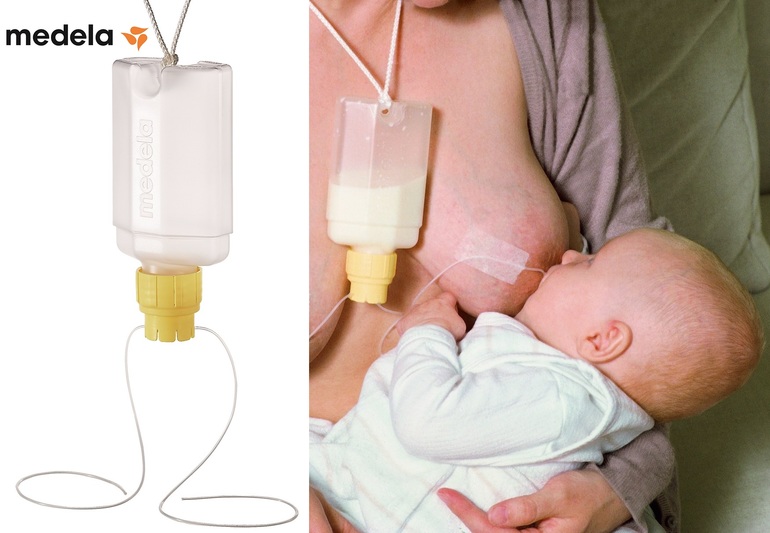 Otherwise, gravity is in control.
Otherwise, gravity is in control.
For babies who are bottle-fed by multiple caregivers, Gorman says all of the people who administer feeds should be educated on paced bottle-feeding.
Finally, you should never prop the bottle up to feed your baby and walk away. Since they can’t control the flow of the milk, it will keep coming even if your baby is not ready to swallow.
“The mechanism of swallowing is complicated and requires several muscle groups working together in concert and in the right time sequence,” Hamilton says. Fortunately, gagging usually diminishes as children get older and become better at swallowing.
Still, if you’re a new parent or caregiver, it’s smart to take infant cardiopulmonary resuscitation (CPR). While rare, a choking episode that caused your baby to turn blue or lose consciousness would be an emergency.
If you’re having problems related to breastfeeding, contact a LLL leader or International Board Certified Lactation Consultant (IBCLC). They can help you with your baby’s latch, positioning, oversupply issues, and forceful let-down problems.
They can help you with your baby’s latch, positioning, oversupply issues, and forceful let-down problems.
If you’re having problems related to bottle feeding, contact your child’s pediatrician. They can help you with bottle and nipple selection, as well as feeding positions that prevent choking on milk or formula.
If your baby continues to choke even after slowing down the rate of feeding, you should contact your pediatrician to rule out any anatomical reasons why swallowing may be challenging.
When you hear your baby gagging or choking during feeding, don’t panic. Take baby off the nipple and prop them up to help them clear their airway.
Often it will take a little time for your baby to learn suckle with ease. In the meantime, try keeping your baby upright during feedings and make the flow of milk slower, if possible. Soon enough, feeding time will be a sweet snuggle session!
Why Baby Chokes On Breastmilk And What To Do About It
Stop feeding, hold them upright, and pat their back until choking subsides.
Research-backed
MomJunction believes in providing reliable, research-backed information to you. As per our strong editorial policy requirements, we base our health articles on references (citations) taken from authority sites, international journals, and research studies. However, if you find any incongruencies, feel free to write to us.
Image: Shutterstock
If you see your baby choking on breastmilk, it could be because their swallowing skills aren’t fully developed. Choking when breastfeeding can result in innocuous coughing. Further, milk can sometimes make its way into the lungs, causing aspiration pneumonia (1).
If your baby has rapid breathing, turns blue, or becomes unconscious from choking on breast milk, get emergency medical attention. If your baby has experienced many choking incidents, you might want to see a pediatrician.
Read on to learn more about the reasons for choking in babies, preventive measures, and what to do if you find yourself in this scenario.
Why Does A Baby Choke While Breastfeeding?
A baby can choke on breastmilk due to various reasons ranging from normal immature swallowing to feeding problems due to anatomical or functional disorders. It can also be due to maternal factors.
The main causes of choking while breastfeeding can be (2):
- Oversupply of breast milk: Faster milk flow is one of the major causes of choking on breast milk. Infants may not be able to swallow quickly. This may often happen if the mother has an oversupply of breast milk. The baby may bite while breastfeeding due to the overflow of milk, thus making swallowing further difficult.
Related: How To Dry Up Breastmilk And How Long Does It Take?
- Overactive letdown: It is the forceful ejection of milk when your baby is sucking. Let down reflex is controlled by oxytocin hormones. Increased release of breast milk can cause gulping, coughing, or choking in infants.

Image: Shutterstock
Infants who have feeding difficulties are associated with a high risk of choking while breastfeeding or bottle-feeding. The following congenital abnormalities may result in feeding problems (3)
.
- Developmental delay
- Neurological issues such as cerebral palsy
- Down’s syndrome
- Structural anomalies of oral, respiratory, or feeding structures, such as cleft lip and palate and Pierre Robin syndrome
- Gastrointestinal issues, such as tracheoesophageal fistula
- Congenital heart diseases
- Lung and liver diseases
A healthcare provider should examine if there is frequent choking while feeding. Early intervention could reduce the risk of aspiration pneumonia and other complications.
Be watchful
Excessive mucus in the nose and throat may trigger the baby’s gag reflex, which may appear like the baby is choking during feeding. Suctioning the nose and mouth with a bulb syringe may help (7).
Suctioning the nose and mouth with a bulb syringe may help (7).
What To Do If A Baby Chokes While Breastfeeding?
Gagging and choking during nursing is common in young babies. Most of the time, babies can protect themselves from aspiration due to hyper-gag reflex.
The following can be done if your baby chokes while nursing (4).
- Stop feeding if the baby chokes on milk.
- Hold the baby in an upright position for a few seconds. This could help babies to manage the problem.
- Provide good head and neck support while holding younger infants in an upright position.
- Patting the baby’s back may help them.
Image: Shutterstock
If the baby turns blue or becomes unconscious after choking, seek emergency medical care. You should also contact a pediatrician if choking occurs in bottle-fed infants.
Quick tip
Keeping the baby upright and holding the bottle in a horizontal position while feeding can reduce the milk flow, which could help prevent choking due to milk oversupply (8).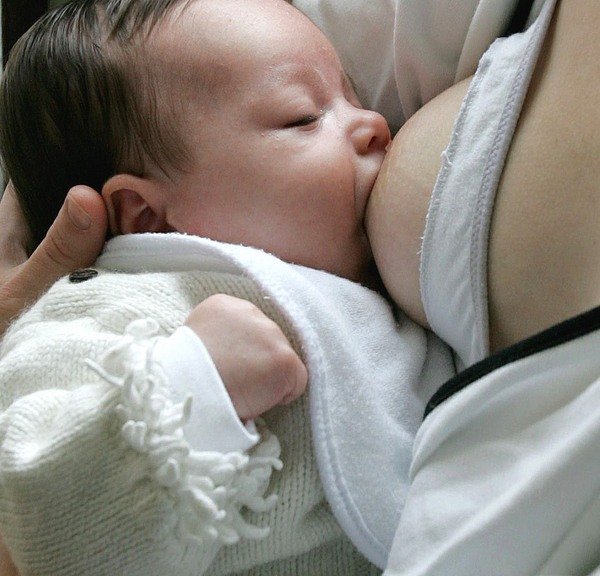
Related: 8 Benefits For Laid Back Breastfeeding, How To Do And Tips
How to Prevent Choking While Breastfeeding?
The following remedies may help reduce or prevent the incidence of choking on breast milk (1).
- Changing the feeding position is the best way to prevent choking while nursing. The laid-back feeding position is recommended for mothers who have an overactive letdown. This may help slow down milk flow due to gravity, and the baby could manage the flow better.
- You may try to take the baby off the breast for a few minutes during the initial letdown after sucking.
- Lying on the side may also reduce choking incidents. This position may allow the baby to let go of the breast and let the milk flow outside their mouth, to avert choking.
- You may also express milk a few minutes before feeding to reduce overflow and help to control let down.
Image: Shutterstock
- It is recommended to seek help from international board-certified lactation consultants (IBCLC) to manage overflow and hyperactive letdown issues.
 A pediatrician may also help to choose the right bottles and positions to prevent choking while formula feeding.
A pediatrician may also help to choose the right bottles and positions to prevent choking while formula feeding.
Note: You should be cautious while expressing or pumping milk since doing it for a longer duration may worsen the outcome. Consult a board-certified lactation consultant who can teach you the correct way to express or pump breast milk.
Quick tip
While breastfeeding, apply pressure behind the areola using your free hand’s first and second fingers to reduce the milk flow. Ease up on the pressure once the baby settles into the feeding (2).
Related: When To Do Side-Lying Breastfeeding And 8 Steps To Follow
1. Can babies choke on milk while sleeping on their backs?
No. The common belief that babies may choke while sleeping on their backs is false. Your baby’s gag reflex and airway anatomy prevent them from choking and enable them to sleep comfortably (5).
2. Can reflux cause babies to choke?
Yes, since some food and stomach acid travel back to the food pipe during reflux, it may cause babies to choke. However, the condition does not cause any worry as long as your baby is healthy. Further, sleeping on the back may help babies with reflux (6) (5).
However, the condition does not cause any worry as long as your baby is healthy. Further, sleeping on the back may help babies with reflux (6) (5).
If you are worried about your baby choking on breastmilk, you must understand that the feeding skills of babies improve as they grow older. It is improbable for older babies to choke while nursing as they should be well acquainted with the procedure by now. However, if your little one lacks the age-appropriate ability to suck and swallow milk efficiently, they may be facing feeding difficulties. In such situations, you must consult your baby’s pediatrician to understand ways to avoid this problem and evaluate how to manage the situation.
Key Pointers
- Feeding difficulties, oversupply, and overactive letdown can cause the babies to choke on breastmilk.
- It is recommended to stop feeding and keep the baby in an upright position immediately when they choke while feeding.
- You may change feeding position, manage oversupply, or express milk before feeding to reduce choking while nursing.

References:
1. Aspiration pneumonia; U.S. National Library of Medicine
2. Oversupply; La Leche League International (LLLI)
3. Choking On Milk; My Health; The Government of Malaysia
4. Infant choking while breastfeeding; New Kids-center
5. How to Keep Your Sleeping Baby Safe: AAP Policy Explained; Healthy children; AAP
6. Breastfeeding challenges; NHS
7. Why Do Babies Choke On Mucus?; Children’s National
8. Paced Bottle Feeding; Mater Mother’s Hospital
The following two tabs change content below.
- Reviewer
- Author
Dr. Bisny T. Joseph is a Georgian Board-certified physician. She has completed her professional graduate degree as a medical doctor from Tbilisi State Medical University, Georgia. She has 3+ years of experience in various sectors of medical affairs as a physician, medical reviewer, medical writer, health coach, and Q&A expert. Her interest in digital medical education and patient education made...
Her interest in digital medical education and patient education made...
View Profile ›
Rebecca Koyf is an International Board Certified Lactation Consultant (IBCLC), Registered Lactation Consultant (RLC),Certified Lactation Counselor (CLC) and a LaLeche League volunteer. She has a Bachelor's degree in Accounting and worked as an Auditor for the NYC Comptroller’s Office for 8 years. Her own breastfeeding struggles made her change her career and pursue the field in lactation. She has her...
View Profile ›
The child chokes when feeding: what to do?
Nikulina Anastasia Anatolyevna
pediatrician
A newborn chokes when feeding for various reasons. Some of them the mother can eliminate, while others depend on the health of the baby. The pediatrician Anastasia Anatolyevna Nikulina will explain the causes and solutions to this problem.
— Anastasia Anatolyevna, at what age do children most often choke while feeding? nine0010
— In the first weeks of life, when the swallowing reflex is still very weak, it is difficult to dose milk supply from the breast. From the bottle, the flow of formula is controlled by the opening in the nipple and the tilt. If the hole in the nipple is not age appropriate, it is tight, then the newborn swallows air. Excess air with the mixture will enter the intestines, causing discomfort to the baby.
From the bottle, the flow of formula is controlled by the opening in the nipple and the tilt. If the hole in the nipple is not age appropriate, it is tight, then the newborn swallows air. Excess air with the mixture will enter the intestines, causing discomfort to the baby.
Why does the baby choke while breastfeeding or bottle feeding
- Baby position or bottle angle not optimal. in the optimal position. In the right position, the hand of the woman who holds the child lies on the support. Hold the baby by the back and shoulders, directing the head to the chest. You can’t press hard on the head - the baby will recline it back reflexively. nine0019
- Anatomical features of the mother's breast, in which a woman produces enough breast milk, but it is difficult for a child to suck it out, to eat. Before feeding, the mother needs to express some of the milk or massage the breast: it will become soft, and it will be easier for the baby to suck.
- Large nipples are difficult for a baby to grab - to solve the problem, there are special nipple covers through which newborns are fed.
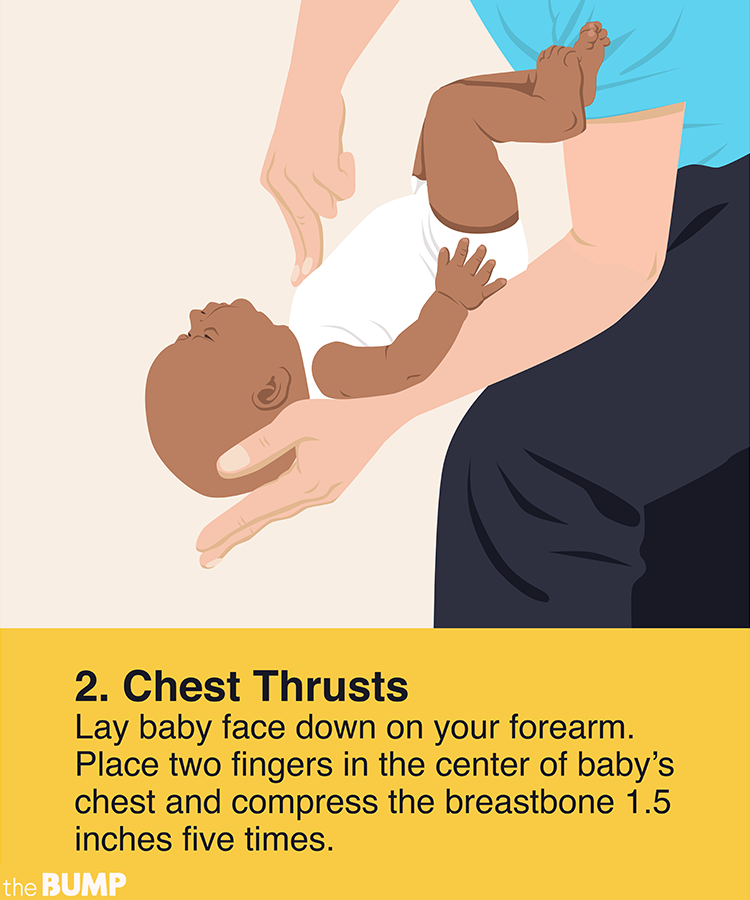 You can feed your baby with expressed milk through a bottle and a nipple that is correctly selected for age. nine0019
You can feed your baby with expressed milk through a bottle and a nipple that is correctly selected for age. nine0019 - Hyperlactation. Pressurized breast milk squirts into the baby's mouth. Before feeding, some of the foremilk is expressed, and the following, more fatty, does not form a strong flow. Breaks in the sucking process also help.
- Frequent breastfeeding. The absence of long breaks between attachments to the breast prevents children from hunger and, with it, the rush to feed.
- Incorrect bottle delivery method. The neck of the bottle must be completely filled with milk: this way there will be no air in the milk. The nipple is selected taking into account the age of the baby. nine0019
- Disease. Nasal obstruction or cough interferes with feeding. Relief of the symptoms of the disease will improve nutrition. For some children, problems can be caused by improper swallowing or reflux.
- To understand why the baby is having difficulty swallowing, you need to gradually eliminate each of the possible causes.
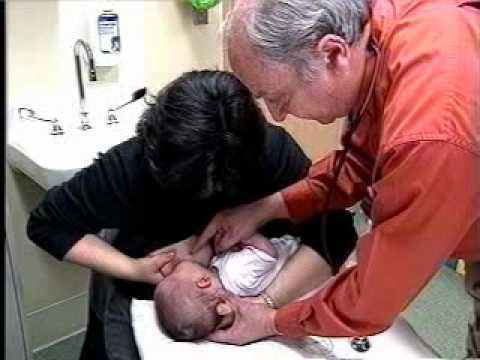 Even the environment matters. During feeding hours, it is desirable for a woman to be alone with the child, nothing should distract him from the process. If the mother finds it difficult to identify the cause, a pediatrician will help her. nine0019
Even the environment matters. During feeding hours, it is desirable for a woman to be alone with the child, nothing should distract him from the process. If the mother finds it difficult to identify the cause, a pediatrician will help her. nine0019
— What should I do if my child chokes on milk or formula?
- Spontaneous cough is the main symptom that appears when the act of sucking and swallowing is disturbed. The baby is crying and refuses to eat.
First aid for choking children
If you can’t cough up excess milk on your own or the baby chokes on saliva and starts to choke, you need to do the following, dosing the force of your actions:
- Place the baby on one hand with the belly down, with your free hand apply pressure on the area above the navel (on the area of the baby's stomach), supporting the chin.
- Tilt the child slightly forward, lightly pat on the back. This will increase the cough and help restore breathing.

- Can I continue feeding after the baby clears his throat, or should I take a break?
- Feeding can be continued after the baby clears his throat. It is advisable to vilify it with a column for two to three minutes, so that excess air comes out, and then resume feeding. nine0003
- Does increasing the interval between feedings help with the problem?
- On the contrary, the prevention of flooding will be frequent feeding. With numerous attachments, less milk accumulates in the woman’s breast, it becomes easier for the mother to feed.
If the child is choking, feeding should be interrupted. The baby will cough, rest and continue to suck. If the situation recurs frequently, be sure to consult your pediatrician. Your doctor can help you find the best breastfeeding or formula-feeding method for you. nine0003
* Breast milk is the best food for babies. WHO recommends exclusive breastfeeding for the first 6 months of a child's life and continued breastfeeding after complementary foods are introduced until the age of 2 years. Before introducing new products into the baby's diet, you should consult with a specialist. The material is for informational purposes and cannot replace the advice of a healthcare professional. For feeding children from birth. The product is certified.
Before introducing new products into the baby's diet, you should consult with a specialist. The material is for informational purposes and cannot replace the advice of a healthcare professional. For feeding children from birth. The product is certified.
#Tips for Mom #regurgitation 7-12 #regurgitation 12 plus
See also
Neurologist for a child under one year old: first examination
#Tips for Mom #Baby development
Yakovenko Margarita Pavlovna
Candidate of Medical Sciences, Pediatrician, Pediatric Neurologist, Medical Advisor MAMAKO ®
Digestion in newborns and infants and its features
#Baby Digestion #breast-feeding #baby formula #Lure #Tips for mom #Baby development
Kiseleva Elena Sergeevna
Candidate of Medical Sciences, Scientific Advisor MAMAKO ®
Principles of successful lactation: checklist for mom
#Tips for Mom #breastfeeding
Yakovenko Margarita Pavlovna
Candidate of Medical Sciences, Pediatrician, Pediatric Neurologist, Medical Advisor MAMAKO ®
Omicron in children: how dangerous it is and how babies get sick up to a year
#Advice for Mom
Kiseleva Elena Sergeevna
Candidate of Medical Sciences, Scientific Advisor MAMAKO ®
Calendar of doctor visits during the first year of a child's life
#Advice for Mom
Kizino Polina Alexandrovna
pediatrician, perinatal psychologist
Goat's milk in children's nutrition: for or against
#Food #Tips for mom #Baby digestion #breastfeeding
Javier Diaz Castro
professor, lecturer
How to tell if a baby has a food allergy
nine0002 #allergy #Tips for mom #breast-feeding #baby formula #lureKiseleva Elena Sergeevna
Candidate of Medical Sciences, Scientific Advisor MAMAKO ®
First tests and vaccinations: how to prepare yourself and your child
#Tips for Mom
Kizino Polina Alexandrovna
pediatrician, perinatal psychologist
How to properly rock a baby to sleep
#Advice for Mom
Kizino Polina Alexandrovna
pediatrician, perinatal psychologist
Why DHA, ARA and lutein are added to infant formula
#baby formulas #Baby development
Yakovenko Margarita Pavlovna
Candidate of Medical Sciences, Pediatrician, Pediatric Neurologist, Medical Advisor MAMAKO ®
See all
View all
Goat's milk in children's nutrition: for or against
# Lure # Tips for Mom # Baby's digestion # breastfeeding
nine0002 Javier Diaz Castroprofessor, lecturer
Digestion in newborns and infants and its features
# Baby digestion # breast-feeding # infant formula # Lure # Tips for Mom # Baby development
Kiseleva Elena Sergeevna
Candidate of Medical Sciences, Scientific Advisor MAMAKO ®
Neurologist for a child under one year old: first examination
# Tips for mom # Baby development
Yakovenko Margarita Pavlovna
Candidate of Medical Sciences, Pediatrician, Pediatric Neurologist, Medical Advisor MAMAKO ®
Calendar of doctor visits during the first year of a child's life
nine0002 # Tips for momKizino Polina Alexandrovna
pediatrician, perinatal psychologist
Principles of successful lactation: checklist for mom
# Tips for mom # breastfeeding
Yakovenko Margarita Pavlovna
Candidate of Medical Sciences, Pediatrician, Pediatric Neurologist, Medical Advisor MAMAKO ®
How to properly rock a baby to sleep
# Tips for mom
Kizino Polina Alexandrovna
pediatrician, perinatal psychologist
Why DHA, ARA and lutein are added to infant formula
# infant formula # Baby development
Yakovenko Margarita Pavlovna
Candidate of Medical Sciences, Pediatrician, Pediatric Neurologist, Medical Advisor MAMAKO ®
Omicron in children: how dangerous it is and how babies get sick up to a year
# Tips for mom
Kiseleva Elena Sergeevna
Candidate of Medical Sciences, Scientific Advisor MAMAKO ®
See all
nine0002 First tests and vaccinations: how to prepare yourself and your child# Tips for mom
Kizino Polina Alexandrovna
pediatrician, perinatal psychologist
How to tell if a baby has a food allergy
# allergy # Tips for Mom # breast-feeding # infant formula # lure
Kiseleva Elena Sergeevna
Candidate of Medical Sciences, Scientific Advisor MAMAKO ®
See all
View all
View all
Child chokes on milk.
 What to do?
What to do? October 19, 2020
1895 views
0 comments
2 Like I like
Babies may choke while breastfeeding because their swallowing skills are not well developed. The worst thing that can happen is if the milk gets into the lungs and aspiration pneumonia occurs. That is why any non-standard behavior of the baby during feeding, such as groaning or coughing, should not be ignored.
Why does the baby choke on milk while breastfeeding?
A baby may choke on breast milk for a variety of reasons, ranging from immature swallowing, which is normal, to feeding problems due to anatomical or functional abnormalities.
The main causes of choking during breastfeeding can be:
- Too much breast milk. Babies, due to their age, cannot swallow quickly, so any excess liquid entering the mouth will make it difficult to feed.

- "Hyperactive Frustration": This is a strong rush of milk when the baby suckles. The weakened reflex is controlled by the hormones oxytocin. The increased secretion of breast milk can cause convulsions, coughing or choking in infants. nine0019
The following congenital anomalies can lead to feeding problems:
- developmental delay;
- neurological problems such as cerebral palsy;
- Down syndrome;
- structural abnormalities of oral, respiratory or nutritional structures such as cleft lip and palate and Pierre Robin syndrome;
- gastrointestinal problems such as tracheoesophageal fistula;
- congenital heart disease; nine0019
- diseases of the lungs and liver.
What should I do if my baby chokes on milk while feeding?
Gagging and choking during breastfeeding are common in young children. Most of the time, babies are able to protect themselves through the hypervomit reflex.
If the baby begins to choke while feeding:
- Stop feeding.






